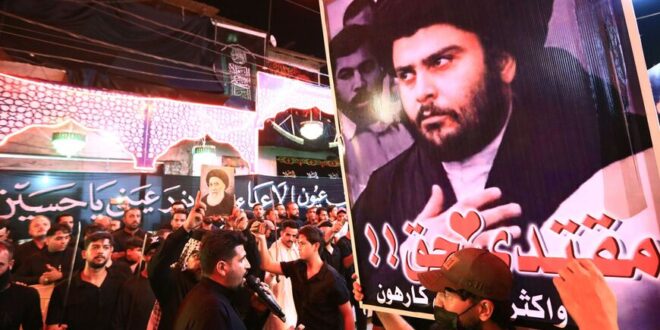Iranian authorities have called on Iraqi factions to seek political solutions as Baghdad streets saw deadly clashes between members of the Shiite Sadrist movement and their Tehran-backed rivals.
Iran’s President Ebrahim Raisi said constitution-based dialogue among political blocs was the only path toward stability and security in Iraq, where the resignation from politics by leading Shiite cleric Muqtada al-Sadr has sparked a fresh wave of violence.
At a meeting with Iraqi Foreign Minister Foad Hussain in Tehran, Raisi also highlighted the “very important role played by Shiite clerical leadership” in deciding Iraq’s political fate.
The meeting was held late Monday only hours after Baghdad turned into a deadly battleground for Sadr supporters and Iraqi security forces. The Sadr loyalists also engaged in clashes with their main Shiite rivals, the Tehran-backed Hashd al-Shaabi, or the Popular Mobilization Units. The chaos was the latest from Iraq’s troubled political scene, and a months-long deadlock due to the failure of rival Shiite camps to reach consensus over the formation of a new government in Baghdad.
Earlier, the Iraqi top diplomat also sat down with his Iranian counterpart Hossein Amir-Abdollahian, who according to official media reports stressed the need for “national unity and respecting legal institutions” as well as “protecting the authority of the Iraqi state.”
As the clashes broke out on Monday, Iranian officials were quick to close all land borders with the neighboring country, with flights immediately suspended until further notice. In a statement, the Islamic Republic’s Embassy in Baghdad urged Iranians to postpone traveling to the Iraqi cities of Baghdad, Kadhimiya and Samarra.
Yet a day later, Iran’s Interior Ministry announced that the crossings were being reopened and flights were expected to resume as scheduled. “News coming from Iraq suggests that the situation is rapidly heading back to normalcy,” declared Deputy Interior Minister for Security and Policing Majid Mir-Ahmadi.
The Iraq tensions were also feared to disrupt Iranian preparations for the weeks-long annual pilgrimage of Arbaeen, the largest Shiite congregation that marks the 40th day after the death anniversary of the third Shiite Imam, Hussain bin Ali. As many as 2 million Iranians have already registered online for their trips to the holy city of Karbala, which a large number of them traditionally take on foot.
Iran’s hard-line press has long been delicately critical of Sadr and his stances with regard to Iraq’s political future. While attempting to remain impartial in the wake of the ongoing unrest, they did claim foul play by foreign states.
The Tasnim news agency affiliated with the Islamic Revolutionary Guard Corps alleged that Saudi-funded media outlets were “fanning the flames of sedition” via political maneuvering in Iraq. The purpose of such coverage, according to Tasnim, was “sowing sectarian divide” in Iraq and deepening the rifts among Shiite groups.
Tasnim also interviewed Iraqi affairs analyst Alireza Majidi, who attested that the protests will subside in the coming days “because Iraqi society is not at ease with anarchy and considers it as a prelude to coups and civil wars.”
 Eurasia Press & News
Eurasia Press & News



